Sheldon Whitehouse heading to Brazil as sole US federal official at COP30


© Joshua Bickel/AP


© Joshua Bickel/AP

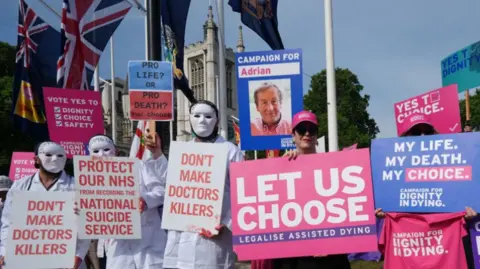 PA Media
PA MediaMembers of the House of Lords have put forward more than 900 proposed changes to the law to deliver assisted dying, ahead of a debate on Friday.
Experts believe the number of amendments, which is understood to be 942, is unprecedented, but opponents say significant alterations are needed to ensure any scheme can operate safely.
The volume of amendments has sparked a letter from 65 supportive peers to their colleagues in the Lords, raising concern about possible delaying tactics.
Those opposing the bill have been urged not to "frustrate" the passage of the legislation, which has already gained the approval of MPs.
The House of Commons passed the Terminally Ill Adults (End of Life) Bill in June, and it passed its first stage in the Lords in September.
The required line-by-line examination of the bill that follows was delayed, following an amendment by Labour's Baroness Berger to allow a committee of peers to scrutinise the legislation further.
Parliament heard officials worked into the early hours of Thursday morning to compile the suggested changes to the bill that flooded in ahead of the next scrutiny stage, known as committee stage, which begins on Friday.
There appear to be seven opponents to the bill who have submitted 579 amendments between them.
According to the parliamentary authorities, while some bills have had more amendments tabled in total at committee stage, it sets a possible record for the number submitted in the first full list of suggested changes.
They say it is almost certainly unprecedented for the committee stage of this type of bill, known as a private member's bill, which has been put forward by backbench Labour MP Kim Leadbeater rather than the government.
Experts including Matthew England, a researcher at the Hansard Society, said the number of amendments "does appear to be a record, at least in the recent past".
Others drew comparisons to the bill to take the UK out of the European Union, which had 820 amendments in total.
A peer in favour of the legislation told the BBC that the number of amendments "looks like a delaying tactic to me... It's obviously not a coincidence."
Defending the volume of amendments, Baroness Luciana Berger, who opposes assisted dying, told the BBC that evidence to the select committee "strongly refuted any suggestion this bill is either safe or workable".
"This bill is full of holes which vulnerable people will fall through and be harmed if peers don't act to change and amend it," she added.
However, signatories to the letter highlighted how the bill had "already undergone unprecedented scrutiny" and "offers dying people the choice of a safe, dignified end while strengthening protections for the vulnerable".
Former Royal College of Nursing president Baroness Rafferty was among the 65 peers to have signed, and she was joined by scientist and broadcaster Lord Winston, former Labour leader Lord Kinnock and former Whitehall chief Lord O'Donnell.
They urged opponents to focus on refining the bill to find where "genuine improvements can be made, while respecting both the will of the Commons and the overwhelming support of the public".
In response to the letter, a source close to peers who are concerned about the bill said: "This letter is making claims directly contradicted by the evidence provided in the last few weeks at the Lords select committee by the royal colleges, professionals and independent statutory bodies.
"Evidence and facts are vital when crafting good legislation."
The bill is being treated by parties as a matter of conscience, meaning they will not instruct their MPs or peers how to vote.
The bill will become law in England and Wales only if both the House of Commons and House of Lords agree on the final drafting of the legislation - with approval needed before spring next year, when the current session of Parliament ends.
If it does pass into law, the government has four years in which to get an assisted dying service into place, meaning it could be 2029/30 before the first assisted death happens.
The legislation proposes allowing terminally ill adults with fewer than six months to live to apply for an assisted death.
This would be subject to approval by two doctors and a panel featuring a social worker, a senior legal figure and a psychiatrist.


Sign up for our Politics Essential newsletter to read top political analysis, gain insight from across the UK and stay up to speed with the big moments. It'll be delivered straight to your inbox every weekday.

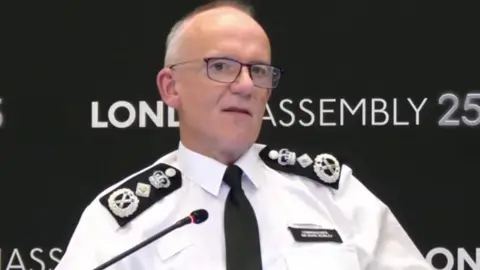 London Assembly
London AssemblyThe Metropolitan Police is investigating "tens" of group-based child sexual abuse cases involving what could be described as grooming gangs, the force's commissioner has said.
An initial data search identified around 9,000 historic cases that might fall under the broad national criteria, but after reviewing 2,200 of them only about 1,200 remained in scope, Sir Mark Rowley told the London Assembly.
The commissioner warned against using "grooming gangs" as a catch-all term because offending includes abuse within families, in institutions, between peers and online.
He said the ethnicities of suspects varied and are "reflective of the diversity we see in the city".
During Thursday's meeting, the police commissioner set out details of a national review of child exploitation cases, which has prompted recent political debate.
Sir Mark said a data search had initially identified about 9,000 historic cases in London that might fall under a national definition of group-based sexual offending, which includes any case with two or more suspects and at least one victim.
He also said that figure had been widely misinterpreted as 9,000 grooming gang cases and had led to "unbalanced reporting".
He said the definition used by the national audit was far broader than the public understanding of grooming gangs and covered intra-familial offending, institutional abuse, peer-on-peer cases and online exploitation.
He told the assembly that after reviewing 2,200 of the 9,000 cases, around 1,200 remained in scope and that the number would continue to fall as the work progressed.
The commissioner said that once the initial assessment was complete, the Met expected "maybe 2,000 or 3,000 cases" to be considered for possible reinvestigation, but stressed this would still cover a wide mix of offending types, not solely grooming gangs.
"We do not see the typology reported elsewhere where there have been cases of offending committed by groups of Pakistani men on white British children being the sole or majority case," added Sir Mark.
He also said the Met recorded around 2,000 sexual offences a month, about half of which involved child sexual abuse, and warned that managing current cases alongside historic ones would require extra funding and specialist officers.
"It is important for us to use precise language and consider its impact on victims and public understanding. There is too much ready reach to simplistic analysis which risks misleading communities," he said.

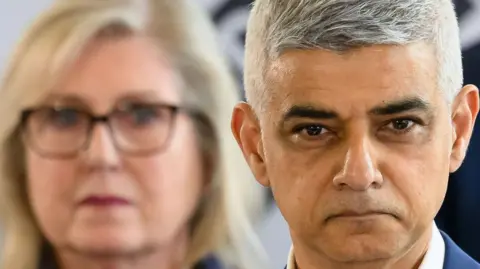 Getty Images
Getty ImagesSir Mark's comments came during a meeting in which London Mayor Sir Sadiq Khan was accused of "taking the mickey" out of victims after previously saying there was "no indication of grooming gangs" operating in the capital.
Susan Hall, Conservative group leader, said: "In January, I asked if we had grooming gangs in London. You dismissed my question by pretending you didn't know what I meant."

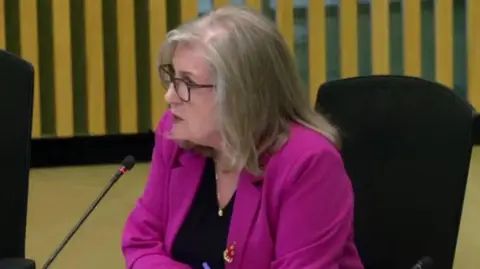 London Assembly
London AssemblySir Sadiq responded by clarifying "what is meant by grooming gangs", according to the national inquiry announced by Prime Minister Sir Keir Starmer in June, and outlined the support provided to victims.
The mayor told the assembly that London had "issues in relation to child sexual exploitation" and "child sexual abuse", but that these cases were different to those seen elsewhere in England.
"I've led efforts to strengthen the protection of children and those exploited by abuse and exploitation," he said.
Listen to the best of BBC Radio London on Sounds and follow BBC London on Facebook, X and Instagram. Send your story ideas to hello.bbclondon@bbc.co.uk

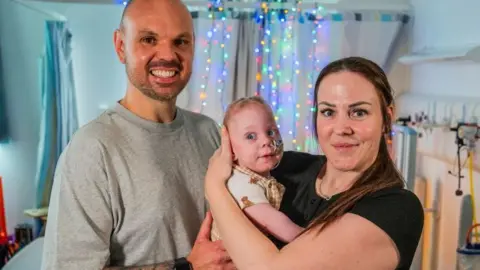 Chris Watt Photography
Chris Watt PhotographyKobi Crolla is not yet 18 months old but he has spent almost all his life in hospital as medics treat him for severe brain damage.
In that time he has suffered countless seizures and endured 17 operations, while his parents have had to give up their jobs to care for him full-time.
Now his mother Kirsty Grandison, 35, is charting their experience on TikTok in a bid to help other parents of sick children in hospital.
"We used to feel like we were the only parent's going through this," she said
"There was no-one online making videos where we could go for advice, so I started making videos to show life in hospital in a bid to help other people."
Her TikTok page has 34,000 followers and receives up to 40 private messages a day.

 Chris Watt Photography
Chris Watt PhotographyKobi was born 10 weeks prematurely at the Royal Hospital for Children and Young People in Edinburgh on 17 July 2024.
Despite weighing just 3lb 3oz, his parents initially thought he was doing well.
However, that night doctors "came pouring" into his hospital room in Edinburgh as his tiny lung had collapsed and he had stopped breathing.
Then Kirsty, 35, and her partner Daniel Crolla, 38, received the news "that changed everything" - Kobi had had a grade four brain bleed, the most severe kind.
They were told he would not have any quality of life and they should prepare for the worst and call their family to say their goodbyes.
Against all odds, Kobi pulled through and eight "agonising" days later, they finally got their first cuddle with their son, which felt like a "miracle".
But his parents said his "battles kept coming" with Kobi developing meningitis and each day bringing a new fear with blood transfusions, lumbar punctures and scans.

 Chris Watt Photography
Chris Watt Photography"He was having up to 10 seizures a day. We were always panicked, always so scared for him. We still are," said Kirsty.
Kobi was diagnosed with hydrocephalus that causes a dangerous build-up of fluid on the brain.
The only option was brain surgery, to install a shunt to allow fluid to be drained from the brain - since then, Kobi has endured 16 surgeries.
"That's 16 times we've handed him over, not knowing if he'd come back," Kirsty said.
Both Daniel, a bus driver, and Kirsty, a carer, have given up their jobs to care full-time for their son.
And Kirsty is using her TikTok page - Kobi The Brave - to give followers a glimpse into the reality of life in a sick kids' unit.
She shows where she buys specially-adapted vests to fit around his feeding tube, how to clean his feeding peg, showing them medicines and setting up Kobi's feeding pump and changing his bed.
"I get messages from other parents in neonatal saying my videos are getting them through and how it's making them not give up hope because they have seen how far Kobi has come from my videos and how well he does despite what he's been through," Kirsty said.
"I want to take all these followers on this journey as I know how many it can help."

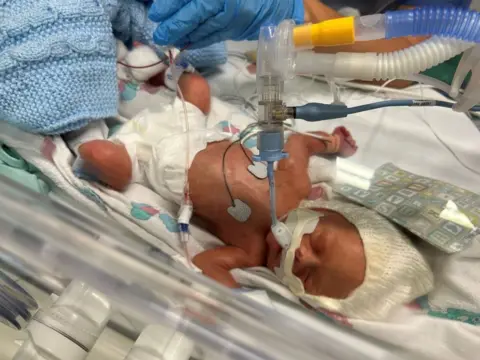 Chris Watt Photography
Chris Watt PhotographyKirsty said caring for Kobi was the "greatest privilege in the world" but it was exhausting, relentless and a lonely journey.
She plans to continue documenting Kobi's story in a bid to help other parents know there are other people going through a similar experience.
"We don't remember the last time we felt at ease, content," Kirsty said.
"We used to have little bits of ourselves outside all this - football, the gym. Now, we go days without having a shower. Sometimes, you wish someone would ask, 'But how are you?'"
Kirsty and her two children from a previous relationship live in Prestonpans, East Lothian, with Daniel, who has three children.
They take it in turns to stay in the hospital with Kobi day and night.
"We've grieved the life we thought we'd have with Kobi," Kirsty said.
"It's hard not to feel jealous sometimes. You see people worrying about hand prints on the walls or toys all over the floor. We'd give anything for that kind of normal."
Now the family are hoping they can have their "cheeky and determined" Kobi at home with them for Christmas, away from the beeping machines and clinical smells of hospital.
"We will be on edge worrying and thinking what might go wrong," said Daniel
"His head can double in size instantaneously and we have to rush him back to hospital, you see all the veins in his head and it's like a balloon.
"It's very traumatic and we are constantly in a fight or flight mode.
"But when the fear feels overwhelming, his smile pulls us back.
"As a family, we can count on one hand the number of days we've had out together.
"That's all we want - more time, more chances to make memories."
The family are being helped with the hidden costs of hospital life by the Edinburgh Children's Hospital Charity.

 Chris Watt Photography
Chris Watt PhotographyPippa Johnston, deputy chief executive officer at Edinburgh Children's Hospital Charity, said Daniel and Kirsty had shown "so much courage and resilience in the face of such unimaginable hardship and uncertainty".
"While many people will be heading home to be with their loved ones, the sad reality is that many children like Kobi, and their families, will spend the festive season in hospital," she said.
"No-one should feel like they're facing hospital alone, especially at Christmas.
"Alongside our friends in the NHS, we'll be there to bring reassurance, comfort and unexpected moments of joy when they're need most."
This week, the US government shutdown finally ended after a record 43 days, the BBC's director general and head of news resigned, and I'm A Celebrity... announced changes to its bushtucker trials.
But how much attention did you pay to what else happened in the world over the past seven days?
Quiz collated by Ben Fell.
Fancy testing your memory? Try last week's quiz, or have a go at something from the archives.

 Getty Images
Getty ImagesImagine one night, you're scrolling through social media on your phone, and the ads start to look remarkably familiar. They're decked out in your favourite colours, are featuring your favourite music and the wording sounds like phrases you regularly use.
Welcome to the future of advertising, which is already here thanks to AI.
Advertising company Cheil UK, for example, has been working with startup Spotlight on using large language AI models to understand people's online activity, and adapt that content based on what the AI interprets an individual's personality to be.
The technology can then mirror how someone talks in terms of tone, phrase and pace to change the text of an ad accordingly, and insert music and colours to match, say, whether the AI deems someone to be introverted or extroverted, or have specific preferences for loud or calm music, or light or dark colours.
The aim is to show countless different ads to millions of people, all unique to them.
Brands in retail, consumer electronics, packaged goods, automotive, insurance and banking are already using the technology to create AI-enhanced, personality-driven ads to target online shoppers.
The AI is able to read what people post on public platforms - Facebook, Instagram, Reddit and other public forums - as well as someone's search history, and, most importantly, what people enter into ChatGPT.
Then, with what it deduces about an individual's personality, the AI overlays that on top of what advertisers already know about people. For example, what part of the country you live in, what age bracket you're in, whether you have children or not, what your hobbies might be, where you go on holiday and what clothes you like to wear - information brands can already see through platforms like Facebook or Google.
That's why the jeans you've been searching online for magically appear in your inbox as a sponsored ad, or the holiday you've been searching for seems to follow you around the internet.

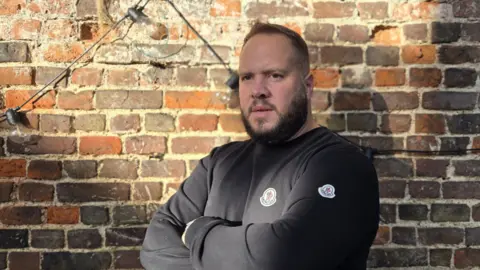 Cheil
CheilThe difference is now AI can change the content of those ads, based on what it thinks your personality is, thanks to what it's been reading about you. It targets individual people, rather than the demographic segments or personas advertisers would traditionally use.
"The shift is that we are moving away from what was collected data based on gender and age, and readily available information, to now, going more into a deeper emotional, psychological level," says Cheil UK CEO Chris Camacho.
"You've now got AI systems that can go in and explore your entire digital footprint - your entire online persona, from your social media interests to what you've been engaging in.
"That level is far deeper than it was previously, and that's when you start to build a picture understanding that individual, so whether they're happy, whether they're sad, or what personal situation they're going through."
An added bonus for advertisers is that they might not even need a bespoke AI system to personalise their output.
Researchers in the US studied the reactions of consumers who were advertised an iPhone, with tailored text written by ChatGPT based on how high that person scored on a list of four different personality attributes.
The study found the personalised text was more persuasive than ads without personalised text - and people didn't mind that it had been written by AI.
"Right now, AI is really excelling on that targeting piece. Where it's still in nascent stages, is on that personalisation piece, where a brand is actually creating creative copy that matches some element of your psychological profile," explains Jacob Teeny, an assistant professor of marketing at Northwestern University's Kellogg School of Management, who led the AI research.
"It still has some development to go, but all roads point to the fact that this will become the way [digital advertising is done]," he adds.
Personalised AI ads could also provide a solution to the problem of digital advertising 'wastage' - the fact that 15% of what brands spend on digital advertising goes unseen or unnoticed, so it generates no value to their business.

 Alex Calder
Alex CalderNot everyone is convinced that personalisation is the right way to go.
"Congratulations - your AI just spent a fortune creating an ad only one person will ever see, and they've already forgotten it," says Brighton-based Alex Calder, chief consultant at AI innovation consultancy Jagged Edge, which is part of digital marketing company Anything is Possible.
"The real opportunity lies in using AI to deepen the relevance of powerful, mass-reach ideas, rather than fragmenting into one-to-one micro-ads that no one remembers. Creepy slop that brags about knowing your intimate details is still slop."
Ivan Mato at brand consultancy Elmwood agrees. He is also questioning whether people will accept it, whether regulators will allow it, and whether brands should even want to operate this way.
"There's also the surveillance question. All of it depends on a data economy that many consumers are increasingly uncomfortable with," says London-based Mr Mato.
"AI opens new creative possibilities, but the real strategic question isn't whether brands can personalise everything - it's whether they should, and what they risk losing if they do."

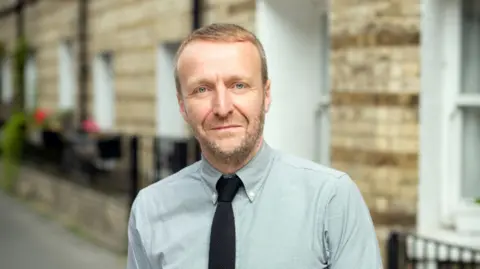 Elmwood
ElmwoodAI-personalised ads could also take a dark turn, Mr Camacho at Cheil UK acknowledges.
"There's going to be the camp that uses AI well and in an ethical manner, and then there's going to be those that use it to persuade, influence, and guide people down paths," he says.
"And that's the bit that I personally find quite scary. When you think about elections and political canvassing, and how the use of AI can influence voting decisions and who is going to be elected next.
But Mr Camacho is committed to staying on the right side of ethics.
"We don't have to use AI to make ads creepy or to influence individuals to do things that are unethical. We're trying to stay on the nicer side of it. We're trying to enhance the connection between brands and individuals, and that's all we've ever tried to do."

 Getty Images
Getty ImagesResident doctors in England are going on strike between 14 and 19 November, in their 13th walkout since March 2023.
The doctors' union, the British Medical Association, is in a long-running dispute with the government over pay for the medics, who were formerly known as junior doctors.
The government says resident doctors have received pay rises totaling nearly 30% in the past three years, but the union says the increases don't go far enough.
Resident doctors make up around half of all doctors in England. As a patient you could come into contact with a resident doctor in any NHS department, including at A&E and in your GP surgery.
Resident doctors are qualified doctors who have completed a medical degree.
Many then enter speciality training in a particular area of medicine and surgery, or train to become a GP.
They used to be known as junior doctors, but in September 2024 the government agreed to change the name of their role to better reflect their expertise.
Full training can take a long time, so although some resident doctors may have only recently finished medical school, others could have more than a decade of practical experience and be responsible for most aspects of care.
During their first foundation year after finishing their medical degree, resident doctors in England earn a basic salary of £38,831. In their second year, this rises to £44,439.
Medics are often expected to work night shifts, weekends and longer hours, for which they receive extra payments.
After eight years or more as a resident doctor, salaries can progress to around £73,000.
During 2023-24, they received a 22% pay increase over two years. From August 2025, they have been given an additional 5.4%.

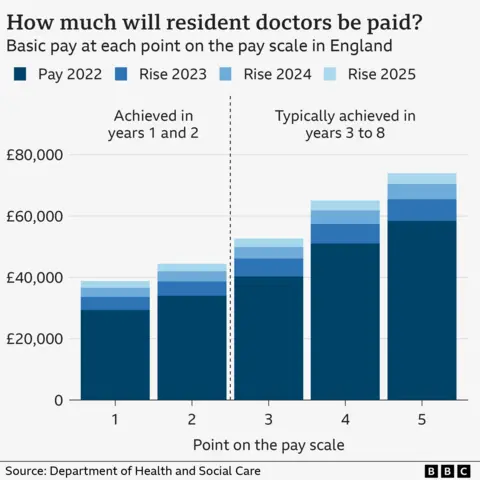
The BMA has called a series of strikes in England over pay and working conditions since 2023.
It argues that resident doctors' pay is 20% lower in real terms than it was in 2008, even after the August 2025 increase.
The government uses the Consumer Prices Index (CPI) measure of inflation to calculate public sector pay increases.
However, the BMA says many resident doctors have large student loans and that interest on these is calculated using a different inflation measure called RPI, which is higher.
Using the CPI measure, the government says resident doctors' current pay is fair.
But analysis from the Nuffield Trust think tank suggests pay has fallen 5% since 2008 if CPI is used, compared with nearly 20% with RPI.
Health Secretary Wes Streeting says resident doctors have received the largest pay rises of any public sector employees over the last three years, and insists the government won't offer any further increases.
In October the union rejected a fresh offer to cover mandatory exam fees and increase the number of specialist training posts by an extra 2,000 places.
These are roles which many doctors apply for two years after qualification.
In 2025, there were more than 30,000 applicants for 10,000 jobs, although some were foreign doctors.
The BMA argues that said that even after the expansion of places, many resident doctors would be left without a job at a crucial point of their training, and said the pay issue still needed to be addressed.
The union said it had told the government there would be no strikes for the foreseeable future if doctors were offered a multi-year deal "that restores pay over time", and expressed disappointment at the lack of progress.
The strike in England will last from 0700 on Friday 14 July to 0700 on Wednesday 19 July.
The NHS has urged patients to "come forward for care as usual" during the period.
Anyone with a life-threatening emergency should call 999 and attend the emergency department if needed.
For urgent, non life-threatening issues the advice is to use the NHS 111 website or to call the helpline. GP surgeries will be open as normal.
Most planned hospital appointments and procedures should go ahead as scheduled. The NHS says anyone whose appointment is postponed will be contacted in advance.
As happened during previous industrial action, hospitals have been told they should only cancel routine appointments in exceptional circumstances.
The target set this time is for a minimum of 95% of "planned activity" to take place on strike days.
But NHS chiefs accept that the ongoing industrial action has disrupted the care for thousands of patients.
Government analysis shows that 507,000 appointments and operations were cancelled or rescheduled during the previous wave of strikes between July 2023 and February 2024 - which involved some consultants.
The latest strike action takes place as the NHS starts to face additional winter pressures, such as a rising number of flu cases.
Scotland, Wales and Northern Ireland are not affected by the latest walk-out.
In May 2025, the government announced pay rises for a number of public sector workers, including:
However, because a medical degree can take five or six years to complete - longer than most other degree courses - the BMA argues resident doctors' pay should reflect the fact that they may have more student debt than other graduates.
Resident doctors also have little control on where and when they are asked to work, and that the need to do placements in different parts of the country can be expensive.
中国国家主席习近平将不出席本月晚些时候举行的二十国集团(G20)峰会,为面临美国总统特朗普抵制的东道国南非带来了又一则坏消息。
中国外交部星期四(11月13日)宣布,国务院总理李强将代表中国出席11月22日在约翰内斯堡开幕的领导人峰会。外交部声明并未解释去年出席G20的习近平为何今年缺席。
G20的创立旨在应对全球经济问题,通常由国家元首出席。彭博社指出,上述决定意味着中美这两个全球最大经济体,以及俄罗斯的最高领导人都将缺席本届G20。
特朗普早前指责南非虐待阿非利卡裔白人(南非和纳米比亚的白人移民后裔),称美国官员将集体缺席。俄罗斯总统普京则因国际刑事法院的逮捕令出席仍受限制。
自冠病疫情以来,习近平大幅减少了国际出访,仅出席在会议间隙举行密集边会的重大峰会,例如上月在亚太经合组织峰会前于韩国与特朗普的会晤。
与此同时,习近平转而推行“主场外交”,今年早些时候接待了普京、印度总理莫迪和朝鲜领导人金正恩,在中美竞争加剧之际寻求与地区国家加强联系。习近平2023年曾赴南非出席金砖国家峰会,去年也在北京接待了非洲国家领导人。
美国国际战略研究中心高级顾问甘思德(Scott Kennedy)指出,习近平缺席G20峰会并不意味着该会议在北京眼中的重要性有所下降,“这些全球治理机构仍是中国传达自身理念的重要场合。”
中国外交部发言人林剑周四在例行记者会上表示,G20领导人峰会首次在非洲大陆举办,具有重要历史意义,表示北京支持南非主席国工作。
中国神舟二十号载人飞船疑似被微小太空碎片撞击后,航天员将在星期五(11月14日)乘坐神舟二十一号飞船返回地面。
据新华社报道,神舟二十号航天员乘组将在星期五,乘坐神舟二十一号飞船返回东风着陆场。
中国载人航天工程办公室称,目前神舟二十号航天员陈冬、陈中瑞、王杰状态良好,着陆场及各参试系统正在紧锣密鼓做好迎接他们回家的各项准备。
根据计划安排,中国后续将择机发射神舟二十二号飞船。
神舟二十号在4月24日发射,航天员乘组共三人,他们已在空间站驻留六个月,完成了全部既定任务。
中国商务部长王文涛星期二(11月11日)与西班牙部长会面时,批评荷兰以行政令方式不当干预安世半导体企业内部事务,呼吁荷兰尽快撤销相关措施。
中国商务部官网星期四(13日)公布王文涛与西班牙经济、贸易与企业大臣奎尔波会面内容。双方就中西、中欧经贸关系等交换意见。
王文涛指荷兰政府以行政令方式不当干预安世半导体企业内部事务,严重违背契约精神和市场原则,应为当前全球半导体供应链混乱负主要责任。
王文涛强调,中国为推动解决本案做了大量工作,并积极回应业界的迫切呼声,对符合条件的出口予以许可豁免。中国将继续以理性、专业、负责任的态度与荷方保持沟通。
他也说,希望荷兰以负责任的态度将口头表态切实转为实际行动,“尽快撤销相关措施,纠正错误做法,恢复全球半导体供应链的稳定”。
荷兰政府今年9月底以国家安全为由,强制接管隶属于中国闻泰科技的安世半导体。北京随后对安世在华工厂实施出口禁令,引发全球汽车制造供应链中断的担忧。
不过,美国总统特朗普和中国国家主席习近平10月底于韩国会晤、就经贸问题达成一定共识后,安世风波出现转机。中国已恢复出口部分安世半导体晶片,条件是购买方承诺晶片仅用于民用用途。
日本首相高市早苗和中国外交官言论事件持续发酵,中国副外长孙卫东星期四(11月13日)奉示召见日本驻华大使金杉宪治,对高市的言行提出严正交涉。
中国外交部在官网公布,孙卫东指高市早苗在国会答辩时“公然发表涉台露骨挑衅言论,暗示可能武力介入台海问题,性质影响极其恶劣。在中方多次严正交涉后,日方仍不思悔改,拒不撤回错误言论”。中方对此强烈不满、坚决反对,向日本提出严正交涉和强烈抗议。
孙卫东批评高市的涉台言论“极其错误、极为危险,粗暴干涉中国内政,严重违背国际法和国际关系基本准则,严重破坏战后国际秩序,严重违背一个中国原则和中日四个政治文件精神,严重破坏中日关系政治基础,严重伤害中国人民感情”。
他强调,台湾问题是中国核心利益中的核心,是不可触碰的红线和底线。台湾是中国的神圣领土,台湾事务纯属中国内政。如何解决台湾问题是中国人自己的事,不容任何外来干涉。
孙卫东说,今年是中国人民抗日战争暨世界反法西斯战争胜利80周年,也是台湾光复80周年。“80年前,英勇的中国人民历经14年浴血奋战,打败了日本侵略者。80年后的今天,任何人胆敢以任何形式干涉中国统一大业,中方必将予以迎头痛击!”
他也说,中国再次敦促日本深刻反省历史罪责,“立即反思纠错,收回恶劣言论,不要在错误的道路上越走越远,否则一切后果必须由日方承担”。
中国外交部发言人林剑在同一天举行的例行记者会上警告,如果日本胆敢武力介入台海局势,将构成侵略行为,中方必将迎头痛击。

© Erin Schaff/The New York Times

© Eric Lee for The New York Times



© Doug Mills/The New York Times



© Jason Andrew for The New York Times

© Gabriela Bhaskar/The New York Times

© Adrian Wyld/The Canadian Press, via Associated Press

 Getty Images
Getty ImagesNo-fault evictions will be outlawed in England from 1 May, the government confirmed, as it set out the timeline for sweeping renters' reforms.
The changes also see the end of fixed-term tenancy contracts, as renters move onto so-called "rolling" agreements, as well as an end to "bidding wars" and clearer rules on having pets.
Landlords have said the reforms would increase the screening of prospective tenants and have spoken of nervousness around what happens when tenancies go wrong.
Housing Secretary Steve Reed said the government was "calling time" on "rogue landlords" by initiating a raft of measures in the Renters' Rights Act.
"We're now on a countdown of just months to that law coming in - so good landlords can get ready and bad landlords should clean up their act," he added.
Shadow housing secretary Sir James Cleverly said the reforms "will drive landlords from the market, reduce supply and send prices up for tenants".
He said that, "with a start date of May 2026, we are now set for a six-month fire sale with tenants forced out at short notice".
Approximately 4.4m households in England rented from a private landlord between 2021 to 2023. The new rules will affect more than 11 million people.
The Renters' Rights Act - described as the biggest shake-up to renting in England for more than 30 years - was formally approved at the end of October.
While many renters welcomed the introduction of the timeline, some landlords expressed concern about the speed of the changes.
Ben Beadle, chief executive of the National Residential Landlords Association, said the deadline alone to implement the changes is "not enough".
He added: "We have argued consistently that landlords and property businesses need at least six months from the publication of regulations to ensure the sector is properly prepared for the biggest changes it has faced for over 40 years."
From May, properties will be rented on a "periodic" or rolling basis, rather than under a fixed 12 or 24-month contract.
Tenants who want to leave can give two months' notice, which the government says will prevent tenants paying rent for substandard properties.
Landlords will no longer be able to evict tenants for complaining about poor conditions.
More than 11,000 households in England had their homes repossessed by bailiffs following a section 21 eviction in the year to June.
Victoria, 25, had to suspend studying for her degree after she received a section 21 eviction notice in March.
She was living in Durham while studying at the University of Northumbria and believes the eviction was partly due to complaints about the property's condition.
"I ended up having no choice but to move back in with my parents and I was devastated."


Kerrie Portman, 27, became homeless after reporting significant mold in her Cambridgeshire flat to environmental health in 2020.
The council placed her in temporary accommodation while the landlord was told to address the issue, but she was still stuck paying rent.
She said: "I think it's outrageous that the landlord continued to charge me full rent... ultimately, he didn't really face any obstacles."
A few weeks after she moved back in, she was given a section 21 notice, making her homeless. She would nap in public bathrooms, sleep on long bus routes and shower at her gym.
"I think it's so ridiculous that your whole safety net and foundation can be pulled away on a whim of the landlord," Kerrie said.


Ten households in Hackney, East London, in houses that are all owned by the same landlord, said they had recently been issued with section 21 notices without reason.
One of the affected tenants, who did not want to give her name, said she was "really panicking".
"We were looking for a place this time last year and it took us three to four months to find one," she said.
The government confirmed that all section 21 notices issued before May will stand, but it said landlords must begin court repossession proceedings by 31 July 2026.
The overhaul of the current system means that, from 1 May, landlords will only be able to evict tenants in certain circumstances: if tenants damage a property, commit antisocial behaviour, or fall significantly behind paying the rent.
Maureen Treadwell contacted BBC News with concerns about the new law. Her family rent out 10 properties in Hampshire.
"There are draconian fines if you get things wrong, so the whole thing feels anti-landlord," she said.
She raised her fears that, without reforms to the court system making it quicker to evict bad tenants, there will be an exodus of people who want to let their homes.
"Is it worth letting your house and then having a court fight to recover it, or a one-year delay? It's not worth it. So it will end up making the housing crisis worse."

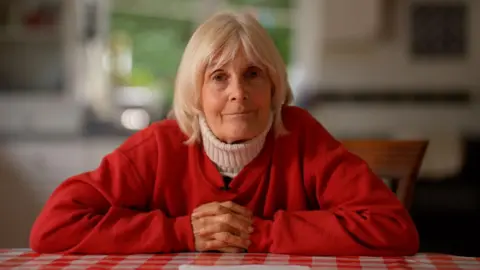
Reed told the BBC he was "working with the Ministry of Justice to look at how we can ensure that there are not undue delays" in situations where a landlord wanted to evict a tenant who was misbehaving.
In addition, landlords will be able to evict tenants if they want to sell or move into the property but not in the first 12 months after a tenancy begins.
The new laws also include banning bidding wars and discrimination of parents and those on benefits, as well as setting out a clearer process for those renting with pets.
Many renters' groups have welcomed the changes. The Renters Reform Coalition - which includes Shelter, Generation Rent and Citizens Advice - says section 21 is "a huge issue".
"It is not the prospect of giving renters these vital rights that is fuelling record homelessness, but the gross injustice of no-fault evictions," said Shelter's Mairi MacRae.
The Renters' Rights Act applies to England. Scotland abolished no-fault evictions in 2017, but Wales and Northern Ireland still have no-fault evictions under something similar to section 21. In 2022, Wales increased the notice period for these to six months.

 London Assembly
London AssemblyThe Metropolitan Police is investigating "tens" of group-based child sexual abuse cases involving what could be described as grooming gangs, the force's commissioner has said.
An initial data search identified around 9,000 historic cases that might fall under the broad national criteria, but after reviewing 2,200 of them only about 1,200 remained in scope, Sir Mark Rowley told the London Assembly.
The commissioner warned against using "grooming gangs" as a catch-all term because offending includes abuse within families, in institutions, between peers and online.
He said the ethnicities of suspects varied and are "reflective of the diversity we see in the city".
During Thursday's meeting, the police commissioner set out details of a national review of child exploitation cases, which has prompted recent political debate.
Sir Mark said a data search had initially identified about 9,000 historic cases in London that might fall under a national definition of group-based sexual offending, which includes any case with two or more suspects and at least one victim.
He also said that figure had been widely misinterpreted as 9,000 grooming gang cases and had led to "unbalanced reporting".
He said the definition used by the national audit was far broader than the public understanding of grooming gangs and covered intra-familial offending, institutional abuse, peer-on-peer cases and online exploitation.
He told the assembly that after reviewing 2,200 of the 9,000 cases, around 1,200 remained in scope and that the number would continue to fall as the work progressed.
The commissioner said that once the initial assessment was complete, the Met expected "maybe 2,000 or 3,000 cases" to be considered for possible reinvestigation, but stressed this would still cover a wide mix of offending types, not solely grooming gangs.
"We do not see the typology reported elsewhere where there have been cases of offending committed by groups of Pakistani men on white British children being the sole or majority case," added Sir Mark.
He also said the Met recorded around 2,000 sexual offences a month, about half of which involved child sexual abuse, and warned that managing current cases alongside historic ones would require extra funding and specialist officers.
"It is important for us to use precise language and consider its impact on victims and public understanding. There is too much ready reach to simplistic analysis which risks misleading communities," he said.

 Getty Images
Getty ImagesSir Mark's comments came during a meeting in which London Mayor Sir Sadiq Khan was accused of "taking the mickey" out of victims after previously saying there was "no indication of grooming gangs" operating in the capital.
Susan Hall, Conservative group leader, said: "In January, I asked if we had grooming gangs in London. You dismissed my question by pretending you didn't know what I meant."

 London Assembly
London AssemblySir Sadiq responded by clarifying "what is meant by grooming gangs", according to the national inquiry announced by Prime Minister Sir Keir Starmer in June, and outlined the support provided to victims.
The mayor told the assembly that London had "issues in relation to child sexual exploitation" and "child sexual abuse", but that these cases were different to those seen elsewhere in England.
"I've led efforts to strengthen the protection of children and those exploited by abuse and exploitation," he said.
Listen to the best of BBC Radio London on Sounds and follow BBC London on Facebook, X and Instagram. Send your story ideas to hello.bbclondon@bbc.co.uk

 BBC
BBCEastEnders favourite Pat Evans, formerly Pat Butcher, is to return to the BBC soap for a one-off episode over the Christmas period.
The character, played by Pam St Clement, was beloved by viewers for more than 25 years for her no-nonsense personality and memorable taste in earrings.
Pat died in 2012, but was later seen on-screen again with Dame Barbara Windsor, when she returned as a figment of the dying Peggy's imagination in 2016.
She will now similarly come back, acting alongside Paul Bradley, as Nigel, whose memories take him back to the 90s, as part of a storyline about his dementia next month.
"I was both surprised and excited to be asked back to tread the streets of Walford once again and to be involved in Nigel's touching dementia storyline," St Clement, 83, said.
"It was lovely to be welcomed back by those with whom I had worked for so long. It was just like coming home."
Pat returns to help Nigel when his dementia symptoms intensify, following an emotional evening at his festive film screening.
St Clement first appeared in EastEnders in 1986 and was at the heart of the drama in Albert Square until her character's death.


EastEnders executive producer Ben Wadey said: "It's an honour and a privilege to welcome Pam St Clement back to EastEnders for a special episode in Nigel's ongoing dementia storyline.
"Pat Evans is one of the most cherished and iconic characters to have graced the streets of Walford, and I know I speak on behalf of everyone when I say what a delight it was to see Pat and Pam back in The Queen Vic, as she helps Nigel in his time of need."
Pat is one of a number of classic characters who have made a return to Walford.
Anita Dobson's Queen Vic landlady Angie Watts made a surprise return to visit her daughter Sharon, as she drifted in and out of consciousness in the show's 40th anniversary episode in February.
Cindy Beale (Michelle Collins) and Zoe Slater (Michelle Ryan) are back in the Square, while Grant Mitchell (Ross Kemp) and Chrissie Watts (Tracy-Ann Oberman) made recent short-term comebacks.

© Jason Henry for The New York Times

© Hiroko Masuike/The New York Times

© Angelina Katsanis for The New York Times

© Tierney L. Cross/The New York Times

 EPA
EPAGermany's coalition government has agreed a new military service plan to boost troop numbers following months of wrangling between political forces.
The new military service plan will mandate all 18-year-old men to fill out a questionnaire on their suitability to serve and, from 2027, to undergo medical screening.
The decision comes as Berlin aims to create Europe's strongest conventional army.
The boss of Germany's biggest defence firm, Rheinmetall, has told the BBC he believes that target could be met in five years.
Armin Papperger said Chancellor Friedrich Merz's aim to boost the Bundeswehr was "realistic" and he told the BBC that "clear decisions" were coming from government.
Earlier this year German defence chief Gen Carsten Breuer warned that the Western Nato alliance had to prepare for a possible Russian attack within four years.
Mr Papperger said he had "no glass ball" about the future but agreed Germany had to be "ready in '29".
When they formed a coalition earlier this year, Merz's conservative CDU/CSU and the centre-left Social Democrat SPD agreed to re-introduce military service which would be voluntary "to start with".
The Bundeswehr currently has around 182,000 troops. The new military service model aims to increase that number by 20,000 over the next year, rising to between 255,000 and 260,000 over the next 10 years, supplemented by approximately 200,000 reservists.
From next year, all 18-year-old men and women will be sent a questionnaire to assess their interest and willingness to join the armed forces. It will be mandatory for men and voluntary for women.
From July 2027 all men aged 18 will also have to take a medical exam to assess their fitness for duty.
If the government's targets are not met, a form of compulsory enlistment could be considered by parliament. If war were to break out, the military would be able to draw on the questionnaires and medical exams for potential recruits.
Some within Germany's political left remain deeply opposed to mandatory service.
Many young Germans are wary and a significant majority oppose it. A recent Forsa survey for Stern magazine suggested while just over half of respondents favoured compulsory service, opposition rose to 63% among 18- to 29-year-olds.
"I don't want to go to war because I don't want to die or I don't want to be shot at," said Jimi, a 17-year-old student from Berlin, who attended an anti-conscription protest outside the Bundestag earlier this week. "I also don't want to shoot people."
An attack against Germany was an "unlikely and abstract scenario" that the government was using to legitimise "stealing millions of young people's right to decide what they should be doing", he said.
Meanwhile, 21-year-old Jason signed up as new Bundeswehr recruit earlier this year because of the current "security situation".
"I wanted to contribute to defend peace, to defend democracy if the worst happens," he said. By joining up he felt he was "giving back to society" but also believed in the deterrent potential of the army, "so potential enemies don't even think about attacking you".


Defence Minister Boris Pistorius has sought to reassure Germans, saying that despite the new military service plan there was "no cause for concern... no reason for fear".
"The more capable of deterrence and defence our armed forces are, through armament through training and through personnel, the less likely it is that we will become a party to a conflict at all," Pistorius said.
Defence spending in Germany tumbled after the end of the Cold War, while conscription was suspended in 2011.
Given its past, Germany has long been shy of showing military might, but earlier this year Friedrich Merz announced that the rule for German defence "now has to be whatever it takes", following Russia's full-scale invasion of Ukraine.
Nato countries across Europe have come under pressure from President Donald Trump's White House to hike spending.
European moves to re-arm have meant significant revenue for Rheinmetall.
Its CEO, Armin Papperger, whose firm also supplies Ukraine, said: "We make a lot of money because there is a huge demand."
"We have to grow strong on vehicles, on ammunition, we have to have our own satellite competencies. We do much more on the electronics and artificial intelligence... than ever before," he said.
A US report last year suggested the Rheinmetall boss had been the target of a Russian assassination plot. There was no confirmation at the time and Mr Papperger would not be drawn on the report, saying: "I feel good, I feel safe."
Asked about whether he felt Europe was in a state of a cold or hybrid war, he said: "Whatever you call it, it's not a peaceful time."

© Go Nakamura for The New York Times

© Pete Marovich for The New York Times